Palestinian Authority President Mahmoud Abbas is reportedly facing substantial pressure to meet with U.S. President Donald Trump’s top Middle East advisers this week, despite the rift between Washington and Ramallah.
Trump’s son-in-law and senior adviser Jared Kushner and U.S. Special Representative for International Negotiations Jason Greenblatt will visit Israel, Egypt and Jordan to discuss the upcoming U.S. peace plan for the region.
Abbas spokesman Nabil Abu Rudeineh told Palestinian media Sunday that Kushner and Greenblatt’s visit is “a waste of time” and that the U.S. peace plan is “doomed to fail.”
He claimed the White House is trying to “separate the Gaza Strip from the West Bank,” and repeated that “without the agreement of the Palestinian people and as long as an attempt to circumvent the legitimate Palestinian institutions continues, the meetings are destined to fail.”
Despite this, Palestinian officials told Israel Hayom Sunday that officials in Saudi Arabia, the United Arab Emirates, Egypt and Jordan, as well as top officials in the Palestinian Authority itself, are pressuring Abbas to meet with the American envoys.
”Discussing the U.S. peace proposal does not obligate the PA to anything, but it would be wise to hear the details before rejecting it outright,” one Palestinian official said.
Abbas has conditioned any meeting with U.S. officials on Washington rescinding its recognition of Jerusalem as the Israeli capital and canceling its embassy move there.
Arab diplomats said the Palestinian leader is likely to compromise and discuss the new American peace plan, albeit under protest.
”The statements by Abu Mazen [Abbas] and his associates in the Arab and Palestinian media against the Trump administration plan are intended for the Palestinian public’s ears,” a senior PA official told Israel Hayom.
”Abu Mazen doesn’t have many options. Eventually, he will have to climb down the tree, compromise, and accept the American plan. This is just a proposal and all the parties have told him that he can’t automatically reject it before studying it,” he said.
Another Palestinian official told Israel that the Palestinian Authority is wary of potential punitive action the U.S. may take against Ramallah, especially given Trump’s unwavering stance against Iran and North Korea on nuclear weapons, and against the European Union and other U.S. allies on issues such as trade tariffs.
”The Palestinian leadership is preoccupied with a power struggle that is being waged behind the scenes over the post-Abbas era,” he said, referring to the ailing 82-year-old leader’s refusal to name a successor.
”Officials in the moderate Arab states and in Washington have made it clear to Abbas that rejecting the U.S. peace plan and the continued boycotting of Trump’s envoys will come back to bite them, and that this is a strategic mistake given President Trump’s hardline policies and the support he has among the moderate Arab states.”
A third PA official confirmed that senior Saudi and UAE officials have made it clear to Abbas that they support the American peace plan and are willing to offer the Palestinians diplomatic and financial guarantees to ensure they return to the negotiating table.
”Abu Mazen has held quite a few conversations with senior officials in Riyadh, Abu Dhabi, Cairo and Amman and he was told, in no uncertain terms, that he has to at least listen to what the American plan includes. He was also assured that he would receive their [the moderate Arab states’] backing for any reservations he might have about the plan,” the official said.
”The main message was that the Palestinian Authority had to listen to the American proposal because Abu Mazen is in no position to dictate terms like who he will or won’t speak with. He will receive the Arab nations’ support as long as his decisions are rational and strategic.
”The direction in which Abu Mazen is leading the PA is diplomatic suicide that the Palestinians are likely to regret for generations to come. We have already seen that Trump is not [previous President Barack] Obama. It’s high time Abu Mazen understood that as well.”


























